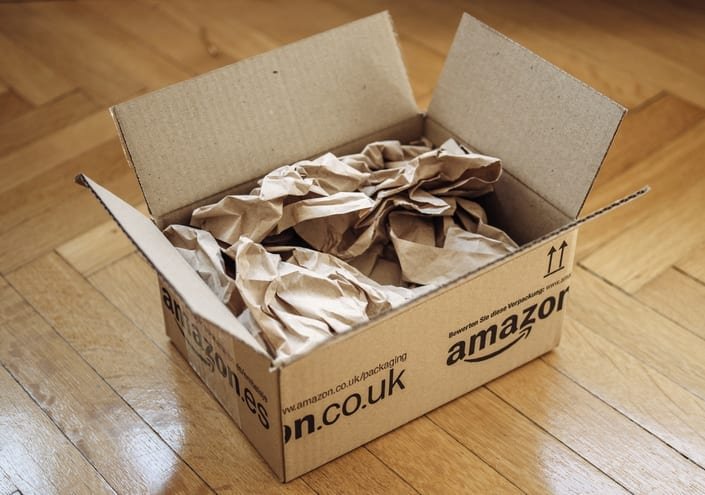In a new study of 2,000 adults, 85% said they believe companies use too much wrapping – despite industry evidence showing a slight reduction in the materials used to deliver products.
Sainsburys, ASOS and Etsy are also among the companies respondents believe use unnecessary packaging.
But when the same study was conducted 12 months ago, 88% felt their shopping came with pointless wrapping – so there has been a decrease of 3% this year.
Toys and veg
Household appliances and children’s toys were deemed the worst items for excessive packaging in 2020 – as they were last year.
Fruit and vegetables were also among the consumer goods that are needlessly packaged, according to the study by the Chartered Institute of Marketing (CIM).
Amazon ‘worst offender’
Amazon topped the list as the worst offender both years running and has even gone up this year: 52% of respondents agreed Amazon uses too much packaging, compared with 47% previously.
On the other hand, supermarket chain Tesco dropped from 14% to 11%.
‘We wanted to see how things had changed in the last year, in terms of excess packaging.
‘While it’s positive to see a slight drop in how many people believe companies are over-packaging their goods, there are a lot of caveats.
‘We know the pandemic and subsequent lockdowns have changed buying behaviours, and there has been a considerable increase in online purchasing which means more home deliveries.
‘So even where companies have improved their packaging, the increased volume and frequency of purchases will naturally push up the amount of packaging in circulation.
‘However, with over a third of people saying they judge companies based on the ethics
of their packaging, there are still serious implications for brands not living up to consumer expectations, and marketers must take note.’
GEMMA BUTLER
Director, Chartered Institute of Marketing
A company’s ethics
The study also found that in 2019, 80% of adults said they would like to see more done by large companies to promote sustainable packaging. However, in 2020 that figure has dropped to 62%.
Instead, a quarter said that as long as their product is protected by the packaging, they don’t mind if there’s excess packaging.
On the other hand, 35% admit they ‘judge’ companies based on the ethics of their packaging.
13% of adults have even complained to a company about their excess packing – but they are more likely (20%) to complain to peers.
 Play Video about This Rock Might Just Save The World
Play Video about This Rock Might Just Save The World Play Video about Play 2 hours of rock
Play Video about Play 2 hours of rock Play Video about Play 2 hours of brook
Play Video about Play 2 hours of brook Play Video about Play 2 hours of sheep
Play Video about Play 2 hours of sheep















































